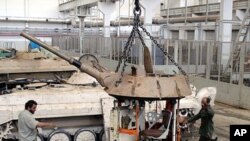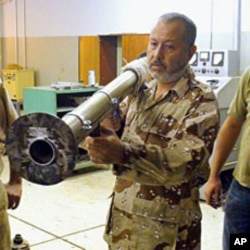The admission by French officials that they have supplied weapons to rebels in western Libya could help explain the opposition's recent territorial gain. The advance has been one of the few breakthroughs in the rebels' fight against the government's professional army.
The rebel leadership has spent four months trying to form a cohesive plan to guide its enthusiastic, but largely amateur fighting force. The results have been mixed.
"We need to organize ourselves," said Jalal elGalal, a media spokesman for the Transitional National Council. "We need better armaments and we need a strategic plan to tackle on open plains. It's difficult, and it's going to be costly. But it's a price the Libyans are willing to pay."
Stalemate
With the rebels bogged down in Brega in the east and around Misrata, their only advance against government forces appears to be in the western mountains, where the opposition has the advantage of French help and higher ground. ElGalal fears even that momentum could falter.
"The stalemate is going to remain on open ground simply because the armaments they have are much superior to what we have," he said. "Although we have the cause [and] we have the will, we can't match them as far as the armaments are concerned."
French officials say recent weapons and munitions help to the rebels keeps within a U.N. mandate to protect civilians - and does not violate sanctions.
UN embargo
French aid notwithstanding, the United Nations has placed an arms embargo for Libya that has hampered the rebels.
On top of that, when government forces withdrew from now opposition-held positions, they took much of the best equipment with them, leaving the rebels to make do with whatever they can find.
At a military camp outside Benghazi, volunteers are becoming expert recyclers. A group of men huddle atop an old tank. A few wrenches with a crowbar, the lift of a crane, and off comes the gun turret. In its place, they fit an anti-aircraft gun, which they hope will give their fighters a longer range of attack. Military liaison Adelrahman Busin points to the ripped out turret, with the gunner's seat beneath painfully exposed, and says it's set to be mounted on a pick-up truck.
"Nothing goes to waste," said Busin. " Everything is used. Even that piece that just came off there will be sent to Misrata and used as a cannon."
Can do spirit
In another room, men are putting the finishing touches on an improvised rocket launcher. A piece of string secures a tea towel around one end - padding for the fighter's shoulder. Busin points out that the safety is a switch from a child's toy car.
"This has been specifically designed for anti-aircraft missiles," he explained. "This was literally made in someone's home. The actual aircraft missiles - you've seen them, the round ones, that come off helicopters and mounted on top of trucks - they've custom-made a single rocket launcher for those same rockets."
This can-do spirit is seen in other rebel supply lines. At the Kalha restaurant, owner Sami Shakmak doesn't mind that recent renovations are obscured by a small army of volunteers.
"We found a gap, the army, they haven't got any food," said Shakmak. "The people on the front line haven't got any food. So for them to actually stay in their places we needed to feed them. So we started from there really and it just escalated."
Donations provide relief
With donations from various charities, they manage to turn out more than 20,000 meals a day.
It's this kind of effort that has taken Libya's opposition from political protesters to defenders against a brutal government crackdown, and now a fighting force trying to advance on the capital. But they recognize they need more.
"I'm hoping the generals here, the chief of staff, the defense minister, are working on something with the military advisers from the international community and I hope something will fall in place pretty soon," said spokesman elGalal.
Even elGalal admits "that might sound a little optimistic."






